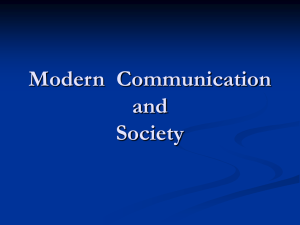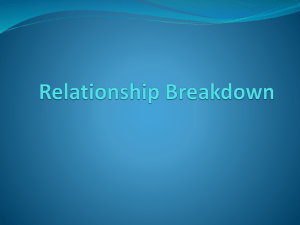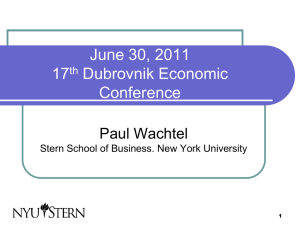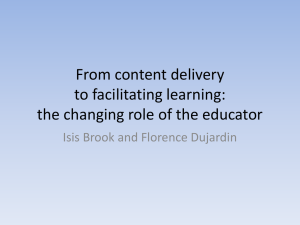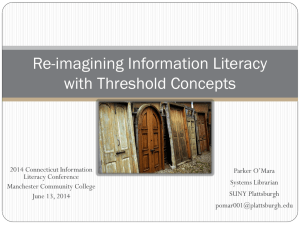Threshold-concepts-for-PGCAP-sup
advertisement
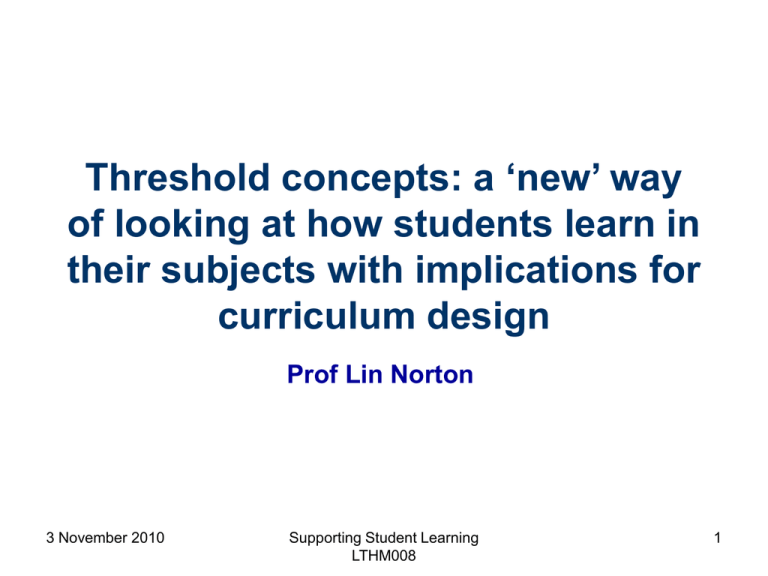
Threshold concepts: a ‘new’ way of looking at how students learn in their subjects with implications for curriculum design Prof Lin Norton 3 November 2010 Supporting Student Learning LTHM008 1 What are they and why focus on them? • Threshold concepts are fundamental to the subject and essential for students to grasp. • They have been described by Land et al (2005) as the ‘jewels in the curriculum’ because they are concepts that subject specialists hold to be central to the mastery of their subject. • They are described as ‘threshold’ because they have particular characteristics 3 November 2010 Supporting Student Learning LTHM008 2 How do students ‘get’ it? (Atherton, 2008) • Teacher of engineering said “that guy will pass his assessments and get his degree, but he’ll never think like an engineer” • Tom Angelo quotes example of physics graduates • Atherton says this is partly to do: – with how we teach (the stuffed curriculum’) – how we assess (what is easy and measurable, tailoring our teaching to help students pass assessments) • Ways of thinking and practising are difficult to teach directly and very difficult to assess except in courses where there are placements. 3 November 2010 Supporting Student Learning LTHM008 • So what might be done? 3 The theory of threshold concepts • Arose from an ESRC/TLA research project which was looking at effective learning environments for undergraduates which looked at this question in 5 subject strands www.tla.ed.ac.uk/etl • Meyer and Land were working in the economics strand and developed their theory out of their realisation that certain concepts were held by economists to be central to the mastery of their subject. If a student is unable to grasp these threshold concepts, she or he may be able to pass their exams and graduate, but they will never be able to think like an economist. 3 November 2010 Supporting Student Learning LTHM008 4 Introducing threshold concepts • Growing body of research (derived from work of Meyer and Land, 2003,2005,2006) to suggest that within every discipline or subject, there are some ideas which hold the key to students getting it: threshold concepts • They are different for each discipline. • They are not the whole answer, but they are necessary for authentic, genuine learning, • If threshold concepts have not been understood, students will never ‘get it’. 3 November 2010 Supporting Student Learning LTHM008 5 What are threshold concepts? • A threshold concept is like a portal, opening up a new and previously inaccessible way of thinking about something. • It represents a transformed way of understanding, or interpreting, or viewing something, without which the learner can not progress. • As a consequence of comprehending a threshold concept there may be a transformed internal view of subject matter, subject landscape, or even world view. • “A threshold concept is thus seen as something distinct within what university teachers would typically describe as ‘core concepts’. • A core concept is a conceptual ‘building block’ that progresses understanding of the subject; it has to be understood but it does not necessarily lead to a qualitatively different view of subject matter” Meyer &Land, 2003 3 November 2010 Supporting Student Learning LTHM008 6 Characteristics of threshold concepts 1. Transformative- marks an important step into the culture of the subject 2. Irreversible- (can’t forget it , but it can be transformed or modified to refine understanding) 3. Integrative- allows us to see the relatedness of ideasenables us to make connections that were previously hidden 4. Bounded- there will be borders with other threshold concepts 5. Troublesome- can be seen as counter-intuitive, unsettling 3 November 2010 Supporting Student Learning LTHM008 7 Example of a threshold concept in L&T in HE: approaches to teaching (1) • What is an ‘expert’ teacher? – – – – Knowledgeable about the subject? Researches the area in which she or he teaches? Scholarly approach to the discipline? Set of advanced teaching skills that present knowledge in such a way as to be readily understood b the students? • All the above are characteristics of an information transmission/ teacher- focussed approach to teaching (see Trigwell & Prosser, 2004) 3 November 2010 Supporting Student Learning LTHM008 8 Example of a threshold concept in L&T in HE: approaches to teaching (2) • A conceptual change/student focused approach to teaching (Trigwell & Prosser, 2004) implies that: – what the student learns is more important than what the teacher teaches – Is related to learning outcomes – Is aimed at helping students change their views and/or conceptions of the phenomena they are studying – Is aimed at helping students reconstruct their knowledge • If you really take this on board, it will change the way you understand the whole process of teaching and learning, it will change your views of students and it will change how you think of yourself as a teacher and what you do • It is, therefore, a threshold concept 3 November 2010 Supporting Student Learning LTHM008 9 Why is that a threshold concept? • Difficult to grasp- books and journal papers have been written about it! • This is a concept that relates to ways of thinking about the discipline of the scholarship of teaching and learning and to our professional practice • Changes our whole understanding of ‘teaching’ and why and how our own struggles as professional practitioners must be worked through (transformative, irreversible and troublesome) • Understanding that difficulties and past conflicts do not have to all be resolved but acknowledged and used (integrative and bounded) • Can be extremely uncomfortable for us as teachers who have our own experiences, are influenced by our colleagues and mentors and may want to reject this understanding (troublesome) 3 November 2010 Supporting Student Learning LTHM008 10 What disciplines are using threshold concepts? •Mathematics- complex numbers and limits in mathematics •Statistics - confidence intervals •Economics- opportunity pricing (most researched) •Biology - evolution •Computer science - object-oriented programming •Health related - caring, clinical fluency in nurses Largely science-based so far. Not much evidence of yet being used in Education/Humanities based subjects ……?? 3 November 2010 Supporting Student Learning LTHM008 11 Not just elements • As more research being done, becoming apparent that threshold concepts are not just single clearly defined elements but may be much more closely aligned to distinctive ways of thinking and practicing. • Some threshold concepts are obvious, but sometimes because they are so obvious we, as teachers, might not pay enough attention to them and do not realise our students do not understand them. (e.g. probability in psychology statistics) 3 November 2010 Supporting Student Learning LTHM008 12 The eureka moment • When real understanding happens it’s irreversible, you cannot un-understand something. • The ‘light has been switched on’, the ‘penny’s dropped’, the ‘aha’ moment. • It’s uplifting and exciting and you want to go on- you are not at the threshold any more, you have gone through the portal • Not all threshold concepts are related to Eureka moments – according to Meyer & Land they can be sighted and rejected, and only gradually accepted, if at all… 3 November 2010 Supporting Student Learning LTHM008 13 So what happens if threshold concepts are not understood? Likely that: – Students will mimic understanding – they are very good at it! (and may be able to go through their whole degree programme ’faking it’) – Learning becomes a ritualised performance – Assessment becomes artificial and mechanistic 3 November 2010 Supporting Student Learning LTHM008 14 What are the 3 November 2010 jewels in the curriculum? Supporting Student Learning LTHM008 15 The jewels in the curriculum are powerful transformative points in the students learning experience- as such they identify key areas that need mastery (Cousins, 2006) According to Land (et al, 2006):“A focus on these jewels allows for richer and more complex insights into aspects of the subjects students are studying; it plays a diagnostic role in alerting tutors to areas of the curriculum where students are likely to encounter troublesome knowledge and experience conceptual difficulty” Cousins suggest practical strategies to help students: Listening for understanding A holding environment for the toleration of confusion Recursiveness and excursiveness 3 November 2010 Supporting Student Learning LTHM008 16 Three questions to ponder 1. Can you think of an example of just one threshold concept in your subject? 2. How can you distinguish between genuine understanding of this threshold concept and a fake or simulated understanding? 3. Can you give an example of how you would organise the teaching and assessment experience which would most likely lead to students properly grasping this threshold concept? 3 November 2010 Supporting Student Learning LTHM008 17 Further reading and resources • Atherton, J.S (2008) Doceo; Introduction to Threshold Concepts (on-line) UK Available http://www.doceo.co.uk/tools/threshold_3.htm • Burchmore, Irvine & Carmichael(2007) Threshold Concepts: A Review of Related Literature. Available http://www.caret.cam.ac.uk/tel/downloads/tel_literature_review.pdf • Land, R., Cousin, G., Meyer, J.H.F. & Davies, P (2005) Threshold concepts and troublesome knowledge (3):implications for course design and evaluation. In C.Rust (ED) Improving student learning12-Diversity and inclusivity (pp 53-64) Oxford, UK; Oxford Brookes University. • Threshold Concepts: Undergraduate Teaching, Postgraduate Training and Professional Development. A short introduction and reference list available at http://www.ee.ucl.ac.uk/~mflanaga/thresholds.html • Erik Meyer, one of keynotes at forthcoming PRHE conference will talk about threshold concepts http://www.hope.ac.uk/learningandteaching/lat.php?page=prhe&current=prhe • Trigwell, K & Prosser, M (2004) Development and Use of the Approaches to Teaching Inventory, Educational Psychology Review, Vol. 16, No. 4, 409-424 3 November 2010 Supporting Student Learning LTHM008 18
